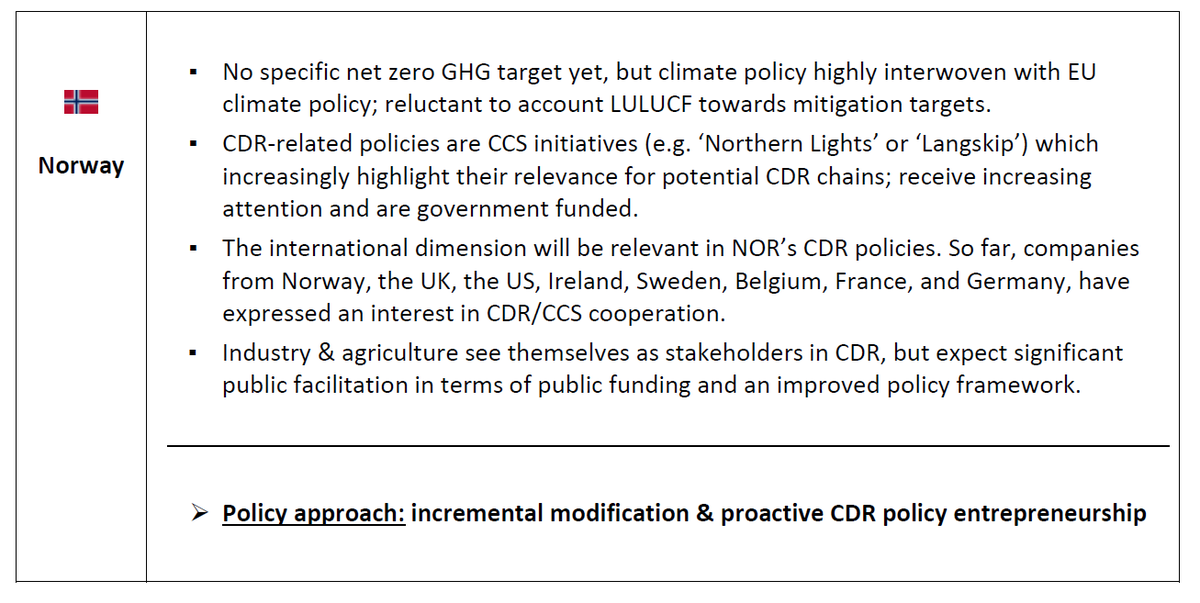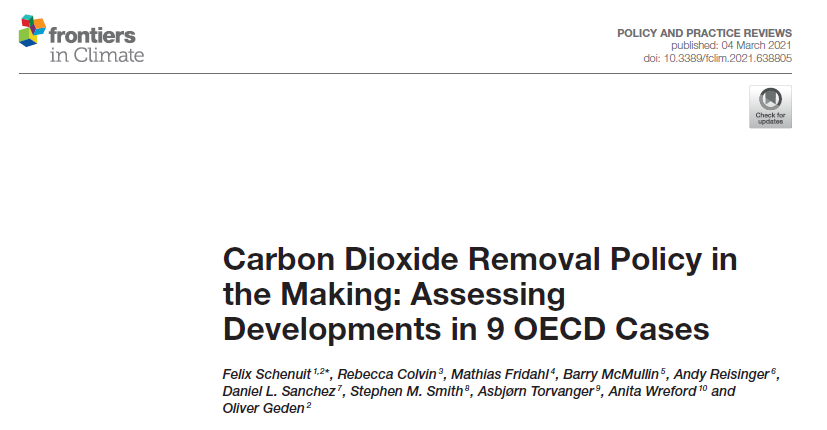
Out now: “Carbon Dioxide Removal Policy in the Making: Assessing Developments in 9 OECD cases”. Our new piece in Frontiers in Climate👉bit.ly/2NWI6ke.
A thread on observations in a rapidly evolving policy field & and the 'varieties of CDR policymaking'. [1/n]
A thread on observations in a rapidly evolving policy field & and the 'varieties of CDR policymaking'. [1/n]

Before I start: A huge thanks to my amazing team of co-authors: @bec_colvin, @MathiasFridahl, @autofac, @ReisingerAndy, @Dan_L_Sanchez, @stv_smth, Asbjørn Torvanger, @AnitaWreford and @Oliver_Geden.
This study would not have been possible without their great contributions. [2/n]
This study would not have been possible without their great contributions. [2/n]
#NetZero targets have emerged as a new ‘organizing principle’ of #climate policy since the adoption of the Paris Agreement and #IPCC’s 1.5°C Special Report. In this context, CDR is rising on the political agenda of governments, policymakers and stakeholders. [3/n] 

Scientific literature on CDR governance & policy is emerging but still rather scarce, with empirical case studies and comparisons largely missing. Our piece provides empirical observations from 9 cases: EU, Germany, Ireland, Sweden, Norway, UK, Australia, New Zealand & US. [4/n] 

Exploring how CDR is being addressed politically is academically & politically relevant: Getting a better understanding of the status quo and plausible prospects for CDR policy is a key element of assessing the feasibility of CDR in the transition to net zero GHG societies. [5/n]
To systematically gather our observations, we developed an analytical framework that draws on the multi-level perspective on socio-technical transitions, as well as the emerging scientific literature on CDR governance – our 5 key dimensions for observations are 👇 [6/n] 

Before turning to our synthesis & conceptualization, I briefly summarize key observations in our cases (this is highly condensed of course, for details check the paper bit.ly/2NWI6ke and the work of our country experts) [7/n].
CDR policy in the 🇪🇺.
The EU Commission has recently started to proactively address CDR. Upcoming revisions of 2030 legislation are expected to include several steps toward integrating CDR.
For more details provided by @Oliver_Geden & myself: bit.ly/2NWI6ke [8/n]
The EU Commission has recently started to proactively address CDR. Upcoming revisions of 2030 legislation are expected to include several steps toward integrating CDR.
For more details provided by @Oliver_Geden & myself: bit.ly/2NWI6ke [8/n]

CDR policy in 🇩🇪.
GER is taking a reluctant approach. This is mainly due to path-dependencies inscribed in the energy transition & a contested CCS debate. However, there are signals of change.
For more details provided by @Oliver_Geden & myself: bit.ly/2NWI6ke [9/n]
GER is taking a reluctant approach. This is mainly due to path-dependencies inscribed in the energy transition & a contested CCS debate. However, there are signals of change.
For more details provided by @Oliver_Geden & myself: bit.ly/2NWI6ke [9/n]

CDR policy in 🇮🇪.
The new Irish government gives new importance to CDR with its climate bill. However, using removals to achieve climate targets is not a completely new aspect of Irish climate policy.
For more details provided by @autofac: bit.ly/2NWI6ke [10/n]
The new Irish government gives new importance to CDR with its climate bill. However, using removals to achieve climate targets is not a completely new aspect of Irish climate policy.
For more details provided by @autofac: bit.ly/2NWI6ke [10/n]

CDR policy in 🇸🇪.
Sweden is one of the pioneers in regulating CDR, esp. BECCS. Its climate law stipulates a 15% share of ‘supplementary measures’ (mostly CDR) to achieve net zero by 2045.
For more details provided by @MathiasFridahl: bit.ly/2NWI6ke [11/n]
Sweden is one of the pioneers in regulating CDR, esp. BECCS. Its climate law stipulates a 15% share of ‘supplementary measures’ (mostly CDR) to achieve net zero by 2045.
For more details provided by @MathiasFridahl: bit.ly/2NWI6ke [11/n]

CDR policy in 🇳🇴.
CDR developments in Norway are linked to CCS under the North Sea. The government & industry support CCS facilities and potential international cooperation in CDR chains.
For more details provided by A. Torvanger (@CICERO_klima): bit.ly/2NWI6ke [12/n]
CDR developments in Norway are linked to CCS under the North Sea. The government & industry support CCS facilities and potential international cooperation in CDR chains.
For more details provided by A. Torvanger (@CICERO_klima): bit.ly/2NWI6ke [12/n]

CDR policy in the 🇬🇧.
The UK is a pioneer in regulating CDR. The debate on GHG removal started earlier compared to other countries; its government proactively supports a wide range of CDR options.
For more details provided by @stv_smth: bit.ly/2NWI6ke [13/n]
The UK is a pioneer in regulating CDR. The debate on GHG removal started earlier compared to other countries; its government proactively supports a wide range of CDR options.
For more details provided by @stv_smth: bit.ly/2NWI6ke [13/n]

CDR policy in 🇦🇺.
In Australia, CDR policy is shaped by highly controversial climate politics, as well as the already implemented integration of ecosystem-based CDR into existing policy instruments.
For more details provided by @bec_colvin: bit.ly/2NWI6ke [14/n]
In Australia, CDR policy is shaped by highly controversial climate politics, as well as the already implemented integration of ecosystem-based CDR into existing policy instruments.
For more details provided by @bec_colvin: bit.ly/2NWI6ke [14/n]

CDR policy in 🇳🇿.
In New Zealand, ecosystem-based CDR is regarded fungible w/ reductions & is integrated into an ETS (following the notion “net emissions is what the atmosphere sees”).
For more details provided by @ReisingerAndy/@AnitaWreford: bit.ly/2NWI6ke [15/n]
In New Zealand, ecosystem-based CDR is regarded fungible w/ reductions & is integrated into an ETS (following the notion “net emissions is what the atmosphere sees”).
For more details provided by @ReisingerAndy/@AnitaWreford: bit.ly/2NWI6ke [15/n]

CDR policy in the 🇺🇸.
Over the past years, Congress already adopted several CDR-relevant bills. The new Biden-Harris administration is expected to accelerate integration of CDR into climate policy.
For more details provided by @Dan_L_Sanchez: bit.ly/2NWI6ke [16/n]
Over the past years, Congress already adopted several CDR-relevant bills. The new Biden-Harris administration is expected to accelerate integration of CDR into climate policy.
For more details provided by @Dan_L_Sanchez: bit.ly/2NWI6ke [16/n]

We provide a systematic synthesis of the cases – i.a. on different accounting practices, and the changing political status of forestry. To conceptualize these findings, we propose 5 dimensions of differences in CDR policymaking & continua of observed manifestations. [17/n] 

We propose a three partite conceptual typology to illustrate the varieties of CDR policymaking we observed. The three idealized types are:
- Incremental modification
- Early integration & fungibility
- Proactive CDR policy entrepreneurship
[18/n]
- Incremental modification
- Early integration & fungibility
- Proactive CDR policy entrepreneurship
[18/n]

In the real world, boundaries between these types are blurry. Countries lean to one type, but do not necessarily match all typical characteristics or may represent hybrids. Further analysis of emerging CDR policy will help to refine the typology. [19/n] 

Future comparative and in-depth analyses of this and other sets of countries will be crucial to explore plausible prospects for CDR policymaking – an important aspect of assessing the feasibility of CDR in transitions to net zero GHG societies. bit.ly/2NWI6ke [20/end] 

• • •
Missing some Tweet in this thread? You can try to
force a refresh


